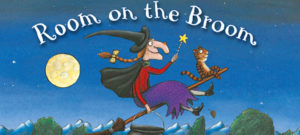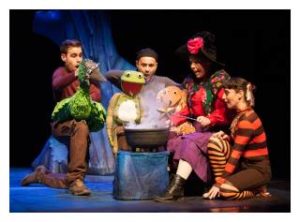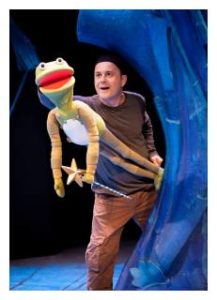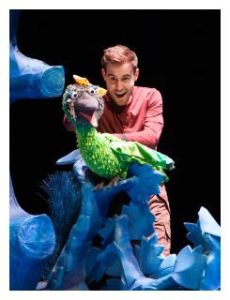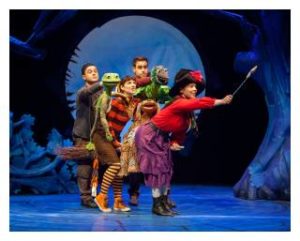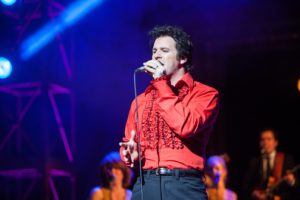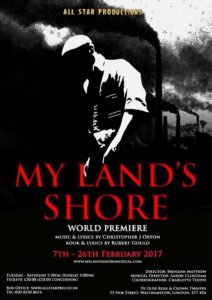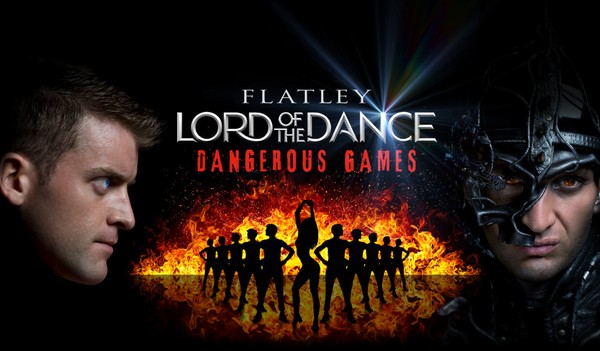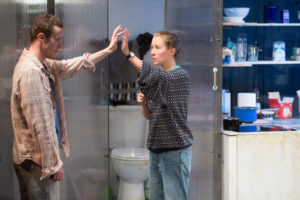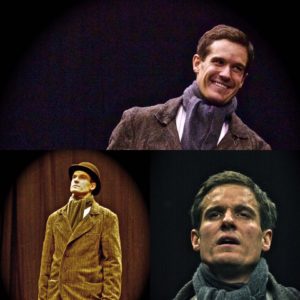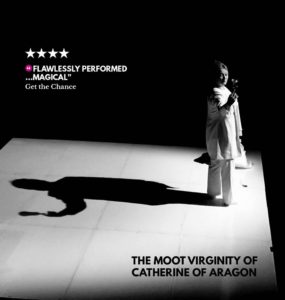Owen Sheers is one of the leading contemporary writers, in Britain, today, a Professor in Creativity at Swansea University, and my  immediate go-to subject of conversation when I don’t want to do any work in English lessons. Sheers was the first writer in residence at the Welsh Rugby Union – the first of any national rugby union team – which resulted in the publication of ‘Calon’ his non-fiction work on the Welsh team. His professional positions have included being Writer in Residence at The Wordsworth Trust and a 2007/08 Dorothy and Lewis B, Cullman Fellow at the New York Public Library. So, with works varying from poetry, to novels and drama, said accolades, and praise for ‘contemporary literature’s renaissance man’ is hardly surprising. But, for me it is Sheer’s stage adaption of his original verse drama, ‘Pink Mist’, commissioned for Radio 4, that currently has me enthused! After speaking with Owen Sheers I ran to tell my friends how amazing he is and how beautiful his ‘phone voice’ is. I’m a groupie.
immediate go-to subject of conversation when I don’t want to do any work in English lessons. Sheers was the first writer in residence at the Welsh Rugby Union – the first of any national rugby union team – which resulted in the publication of ‘Calon’ his non-fiction work on the Welsh team. His professional positions have included being Writer in Residence at The Wordsworth Trust and a 2007/08 Dorothy and Lewis B, Cullman Fellow at the New York Public Library. So, with works varying from poetry, to novels and drama, said accolades, and praise for ‘contemporary literature’s renaissance man’ is hardly surprising. But, for me it is Sheer’s stage adaption of his original verse drama, ‘Pink Mist’, commissioned for Radio 4, that currently has me enthused! After speaking with Owen Sheers I ran to tell my friends how amazing he is and how beautiful his ‘phone voice’ is. I’m a groupie.
Originally, as you wrote primarily as a poet, do you feel like you come to all your work as a poet?
I used to say that ‘I feel like a poet writing in other forms’; I think sometimes that’s still true. So, with something like ‘Pink Mist’ it’s very much, it’s a poet’s play, and actually, in some ways, it feels like my closest relationship with poetry that I’ve had for a long time, because it’s verse drama. It relies very much on rhythm and rhyme and metaphor, but, I suppose, in the model of the dramatic monologue, the retrospect of the dramatic monologue. With ‘Pink Mist’ I very much feel like a poet writing for the theatre. I think what changed me recently was my last novel, ‘I Saw a Man’, where I realised that novels are such wonderful, but difficult beasts, that, actually, you have to feel like a novelist writing a novel, and I wanted ‘I Saw a Man’ to be a different kind work of fiction for me. I think my previous fiction, ‘Resistance’, ‘The Dust Diaries’, you could possibly describe them as being, I guess, a poet’s novels. But I wanted that ‘I Saw a Man’ to feel like a novelist’s novel, and I hope that the story, the book, and the way that the book is structured actually plays with the ideal of the novel, so it was really important to take that fuller step into fiction. So, maybe it’s starting to change for me, and actually funny enough I’ve just finished a second draft of a new play where I wanted to experiment with exactly that – I wanted to write a play as a playwright. Unlike my previous theatrical works which tend to have lots of soliloquys and monologues and a certain lyrical tone, this new play that I’ve just finished is very much dialogue driven and plot-driven, and it’s more like what you would define as a conventional play. I think I am in an interesting period of experimenting stepping more fully out of a poet’s shoes.
How was adapting a verse drama to the stage?
The fact that it was commissioned for radio first, I think, was very significant as with radio you are writing for the ear. And so, it felt instinctive to me to do, to write something that was lyrical but that was also to be very much oral story-telling, and that painted the pictures in a listener’s mind as that was all they got, the voice. But, also, because it’s a play where I’m trying to harness and be at conflict with the voices of others then that also can lean towards drama as it allowed me to invent characters, to invent language but all of it grounded in these thirty interviews that I did, to inform the piece. It sounds paradoxical but when the artifice is turned up – in a verse drama – I think, actually, in some ways, it becomes more accessible, it feels more relating to those original voices. Really the challenge to put it onto stage wasn’t mine, but the directors’. How do you take a play for voices and dramatise it? And that’s where, and I’m not just saying this, I think that the directors John Retallack and George Mann have done an extraordinary job, cause, I mean, it could have easily have been a mess! They’ve not only done it so sensitively but they’ve found a physical language and a dramatic language which feels completely inherited from that style of poetry – which is poetry, but which is grown from everyday speech. The movement in the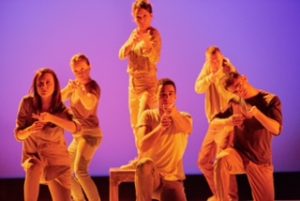 piece is extraordinary; I could watch it all day long. Every single move you can see how it relates back to an everyday action. To be honest, the challenge, it lay very much with the director and the cast, and I suppose that’s how you can feel very lucky in theatre, when writing, cause you kind of hand over this thing which is blessing and a curse!
piece is extraordinary; I could watch it all day long. Every single move you can see how it relates back to an everyday action. To be honest, the challenge, it lay very much with the director and the cast, and I suppose that’s how you can feel very lucky in theatre, when writing, cause you kind of hand over this thing which is blessing and a curse!
How much do you value the accessibility of your work, particularly with young people? And, do you think that poetry needs to be more accessible, or that people need to rise to poetry?
I think it’s both, I mean, I don’t think poetry should be more accessible because I think that you shouldn’t have, to have, the word ‘should’ in literature. A writer can do what they want. Then your job is to do it well, whatever your choices are. But, I think that what we think of as being accessible is sometimes not right and not true. ‘Pink Mist’ is a fine example, actually. All the way through to get it published as a book, to get it put on the stage has been a struggle because the conventional, cultural gatekeepers were quite resistant to the idea of a verse drama. They thought it would be alienating, it would be obscure, and where ‘Pink Mist’ found it’s the first audience was in schools and with university students, and I think with people who didn’t have any pre-conceptions about ‘Oh, verse drama, that sounds a bit strange’, they just responded to it. I think, for them, what was interesting was that they weren’t thinking of T.S Eliot, but they were thinking much more of Kate Tempest, and rap and spoken-word poetry. So, what I say is that I don’t think that we should go into things thinking ‘Is it successful, is it not?’ cause sometimes we’ll be surprised, you know. Something that verse drama does is that it is accessible, not necessarily on a level of meaning, but on a level of rhythm, on this subterranean level of communication. Is it important? It’s all in my work, I’ve always tried to broaden the reach in terms of audience, and broaden the depth. Going back to plays like ‘The Two Worlds of Charlie F’, my year with the Welsh Rugby Union, a lot of that wasabout both attracting the audiences, but showing both existing audiences that ‘actually, you know what, all of us can get this.’ There’s no magic trick. If it’s good stuff then people are, hopefully, emotionally moved and they’re made to think, whatever their background. That’s what is so important about this tour, for me, is that when ‘Pink Mist’ happened at Bristol Old Vic that was great but I really wanted it to get out – well I certainly wanted it to come to Wales, obviously being Welsh. I wanted it to get out to regional towns and cities where, in terms of young men and women, they are choosing to join the army, sometimes as a last option, sometimes because it’s offering things that everyday life isn’t; that can be anything from belonging to just the regular pay packet. It’s in these regional cities where people are really experiencing that the most, and so I was really keen, for ‘Pink Mist’, to travel to these places where, hopefully, the story will resonate as still something very current. So, yes, the answer is young people, with this play, are very important to me, but they’re also important to the play. When I’ve sat in theatres and there’s a younger audience you feel the energy of the play change, cause it’s a play about seventeen and eighteen year olds, and if you’ve got lots of them in the audience it’s just electric. It’s great. 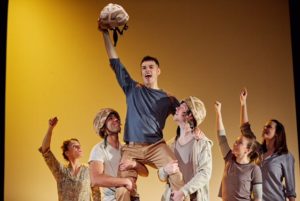
Would you consider writing work specifically targeted at young people, in the future?
Well, I think the important thing to say is that I didn’t target ‘Pink Mist’ at young people and teenagers. The story of the play is one that concerns them, but I think that I am constantly wrong-footed when I go into schools! If I try and, you know, pitch something which is what I think that age group’s level is, they always prove me wrong. ‘Uh uh, it’s way higher mate, it’s way higher.’ So, I’ve learnt that young people and teenagers are perfectly capable of absorbing and responding to plays written for adults – partly because I think it’s when you’re a teenager that you’re feeling and thinking about a world in a particularly vivid way. I quite often think that you care in a way that, sometimes, older people stop doing, which is a shame. But, I suppose yes, I keep wanting to write material and write plays that teenagers and young people feel are equally for them as they are for anyone else. I have started working a piece which is about young boys that were trafficked from Afghanistan to Britain when they were ten or eleven, and now at the age of seventeen, eighteen they’re being faced with deportation; I suppose that is a young person’s story.
Do you have any words of wisdom for young people who want be to artists, who want to create and tell stories?
Yes, well I don’t know if it’s words of wisdom, exactly, but I’d say, firstly, immerse yourself in the art form that you want to excel at. So, if you want to be a playwright see lots of theatre, read lots of theatre. If you want to be a poet, read lots of poetry. You want to be a film maker? Watch films, not just as a passive viewer but as a film maker. Look, how are people doing this? Watch the current language of the day. I’m always amazed at how many people want to be writers, and you ask them what they’re reading and they’re not reading very much. You wouldn’t imagine a rugby player who never watched rugby. Secondly, if you’re sure this is what you want to do, it is for you. The arts still, in Britain, I hope, there should be no barriers to entry, and I think on the whole there isn’t – there are still ways that people can be supported to enter the arts. It’s a very old thing what I’m going to say, it’s nothing particularly wise, but you know, work bloody hard. I still get rejected! Sometimes it’s for the right reasons, and sometimes it’s because someone’s not seeing it – which is then your job to make them see it. Immerse yourself in your art form, work hard, do believe it’s for you and believe that you can do it. Nearly every piece of work I’ve done it has been started with people telling me no. So, you’ve got to be quite stubborn!
How important is it, for you, to be a ‘Welsh’ writer?
Well, it’s an important part of my life, but that’s for me, because I am Welsh, and we all have an attachment to the physical landscape and the cultural landscape that we’re brought up in. But, what I don’t like is Nationalism, or jingoism. And I don’t like any narrowing of the horizons, artistically, through nationalities. It might sound like I’m spitting hairs but I quite often describe myself as a writer from Wales, because that seems truer to me – I am both. In terms of my family, and where I live, I’m from Wales, and how I was formed, I am from Wales, but to say I’m a Welsh writer is… I don’t want to be defined by borders. We partly write so we can write about anything, and we want to write stuff that people respond to everywhere. In Wales, of course, you’ve also got to be aware of saying that you’re a Welsh writer, and when you’re not writing in Welsh, then you’re not entirely describing it truthfully. ‘So, yeah, a writer from Wales.’ W. H. Auden once said that ‘A poet should aspire to be like a good cheese – locally produced, but internationally renowned.’ It’s an odd quote but that’s kind of what I aspire to. I think in terms of influence of the work, yeah of course. A lot of some of my earlier favourite writers were Welsh – the early poets who told me to keep going, keeping trying, like Dannie Abse and Robert Minhinnick were all Welsh. It’s where I first met the arts and saw theatre, so it can’t help but have an influence; I think the Welsh landscape has always influenced me, even when I haven’t lived here.
Although I was left unsuccessful in getting anywhere near to an actual definition, Sheers insists that it is the title’s ambiguity that spirals dramatic intensity.
It should, hopefully, come at you in the play. It’s a title that is designed to slightly wrong-foot the audience. Every conflict produces its own vocabulary, its own lexicon, and ‘pink mist’ was a term that I heard several times from the young men, the young wounded soldiers that I was interviewing. It refers to an element of modern warfare, the asymmetry in warfare.
I think that on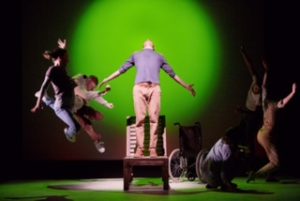 ce you know what it is, it changes from being something vague that sounds quite light to being something, really, very dark and sinister. But, it’s a title I had to fight for. When it was originally commissioned for Radio 4, right up to the control room, they didn’t want to use that title. And, at one point, probably, slightly over-dramatically, I literally down tooled, I stopped writing. ‘I’m not going to finish this play unless I’m allowed to call it ‘Pink Mist.’ So, then they relented and let me call it ‘Pink Mist.’
ce you know what it is, it changes from being something vague that sounds quite light to being something, really, very dark and sinister. But, it’s a title I had to fight for. When it was originally commissioned for Radio 4, right up to the control room, they didn’t want to use that title. And, at one point, probably, slightly over-dramatically, I literally down tooled, I stopped writing. ‘I’m not going to finish this play unless I’m allowed to call it ‘Pink Mist.’ So, then they relented and let me call it ‘Pink Mist.’
After informing Owen of the unfortunate conclusion many schools have had to come to –crippled (culturally and artistically) by the demand for high grades and league table success – regarding the expulsion of GCSE English Literature, for many students, this is what he had to say.
I think that’s terrible. The two go hand-in-hand. How are you going to develop English Language without the example of the rest of it in English Literature? Everyone can find a way into it (literature), and if a kid can’t find a way into it then that’s just bad teaching. As you can tell I feel pretty strongly about that, and I didn’t know that actually. In terms of studied – it’s a huge honour, because I’m aware that I met, I got to read poetry, like a lot of people, for the first time as part of studying, so, again, it’s a huge privilege. And, I’m quite humbled by it, actually. I think it’s very different being studied as to being read, and I would always rather be read. And, I would argue that that’s always the best form of study. It’s strange in the modern world because students can contact you, on Facebook, on Twitter, and via your website, and I’m still figuring out how best to deal with that. I think, if someone asked me a serious and a good question then I’ll always answer. But, actually, it should only be the work that they’re responding to, not me. I do try to still go into schools a lot, you know, I never had a writer come into school when I was there, and it’s great for the writers, and hopefully great for the schools as well. It’s a huge privilege being studied. I sometimes find myself apologising to students, ‘Ohh we have to study your book…’ ‘Well I’m sorry, sorry it’s me, but you’ve got to study someone!’
A review of ‘Pink Mist’ is still to come. Stay tuned my homies… (Mrs Harris)
All production shots of ‘Pink Mist’ were taken by Mark Douet.
Show Times of ‘Pink Mist’ at the Sherman Theatre include: Thursday – 7:30, Friday – 7:30, Saturday – 2:30/7:30
Pink Mist Tour
National Tour
31 Jan – 1 Apr 2017
Presented by Nick Williams Productions
31 Jan-1 Feb, Aberystwth Arts Centre
2-4 Feb, Sherman Theatre, Cardiff
7-9 Feb, New Wolsey Theatre, Ipswich
14-18 Feb, Oxford Playhouse
23-25 Feb, Traverse Theatre, Edinburgh
7-11 Mar, Devonshire Park Theatre, Eastbourne
14 Mar, Pontio, Bangor
17-18 Mar, Taliesin Arts Centre, Swansea
20-21 Mar, Theatre Royal Winchester
23-25 Mar, Birmingham Rep
28 Mar-1 Apr, West Yorkshire Playhouse
By Owen Sheers
Directed by John Retallack and George Mann
Designer Emma Cains
Lighting Designer Peter Harrison
Sound Designer Jon Nicholls
Cast
Peter Edwards
Rebecca Hamilton
Rebecca Killick
Dan Krikler
Zara Ramm
Alex Stedman
 (4 / 5)
(4 / 5)
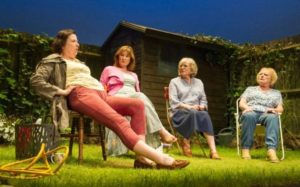
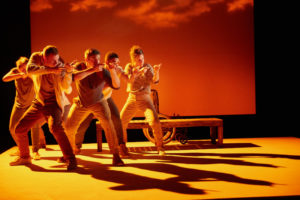

 (5 / 5)
(5 / 5)


